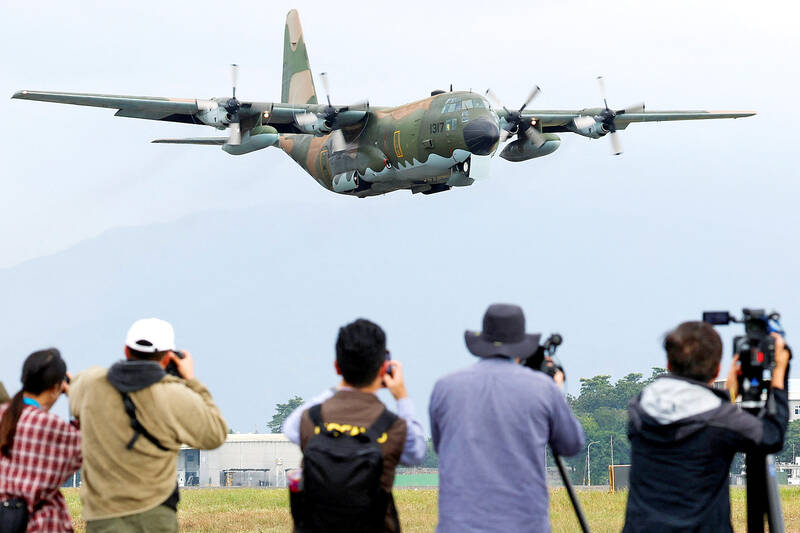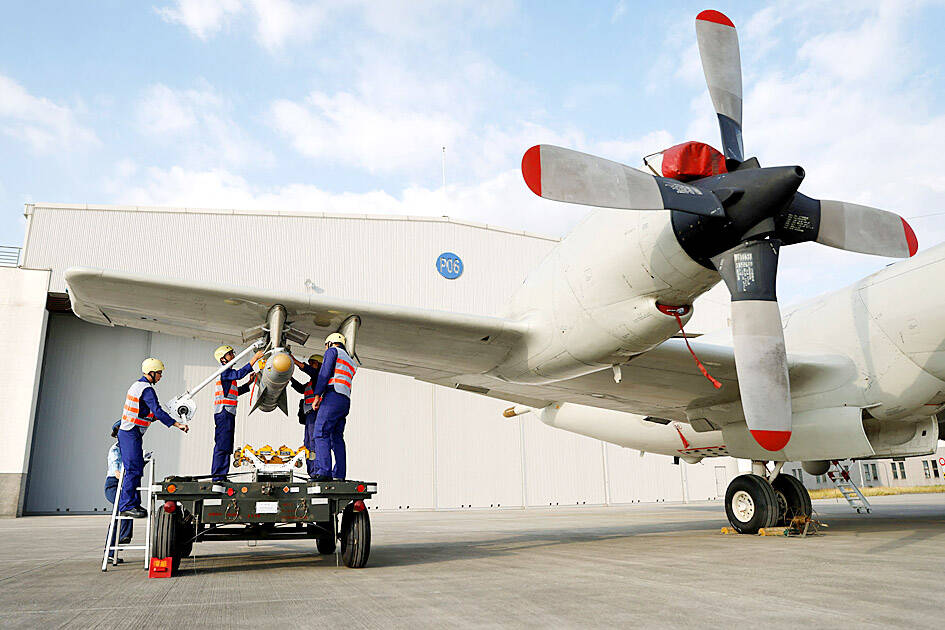Taiwan’s air force showed off its armed-to-the-teeth submarine hunters and early warning and control aircraft on Tuesday, demonstrating how it keeps watch on the skies and waters around the Chinese-claimed island.
China, which views Taiwan as its own territory, has over the past four years regularly sent warplanes and warships into the skies and waters around the island as it seeks to assert sovereignty claims that the government in Taipei rejects.
Taiwan’s air force, dwarfed by China’s but well-armed with mostly U.S. equipment, has been at the front lines of responding to these missions and regularly scrambles to shadow and warn away Chinese aircraft and ships.

Photo: Carlos Garcia Rawlins, Reuters
On a defence ministry-organised media visit to the Pingtung air base in southern Taiwan, the air force displayed its Lockheed Martin P-3C Orion anti-submarine aircraft and Northrop Grumman-built E-2K Hawkeye early warning and control aircraft.
Crews demonstrated attaching missiles under the wing of an Orion, which can be armed with torpedoes, depth charges and U.S.-made Maverick air-to-ground missiles and Harpoon anti-ship missiles.
"We uphold the concept of integrating training for war under the guidance of the defence ministry. We are doing very solid training, which is enough to cope with various situations," said training officer Tsai Tsung-yu.

Photo: Reuters
Taiwan operates 12 Orions, which the U.S. government approved the sale of in 2007 for almost $2 billion. The first aircraft, surplus U.S. Navy stock, entered service with Taiwan in 2013 and can stay airborne for up to 12 hours.
The air force also conducted flybys with one of their E-2K Hawkeye aircraft. Taiwan has six of the planes, but one was damaged in 2022 during a landing accident and is still being repaired.
They have long-range detection abilities, allowing them to direct intercepts from the air and track low-altitude targets flying below the range of ground-based radars.

Photo: Reuters
Their Pingtung base gives the aircraft easy access not only to the Taiwan Strait but also to the Bashi Channel.
That strategic waterway separates Taiwan from the Philippines and connects the South China Sea with the Pacific. Taiwan has reported Chinese warships and warplanes frequently passing through the Bashi Channel.

Eight restaurants in Taiwan yesterday secured a one-star rating from the Michelin Guide Taiwan for the first time, while three one-star restaurants from last year’s edition were promoted to two stars. Forty-three restaurants were awarded one star this year, including 34 in Taipei, five in Taichung and four in Kaohsiung. Hosu (好嶼), Chuan Ya (川雅), Sushi Kajin (鮨嘉仁), aMaze (心宴), La Vie by Thomas Buhner, Yuan Yi (元一) and Frassi in Taipei and Front House (方蒔) in Kaohsiung received a one-star rating for the first time. Hosu is known for innovative Taiwanese dishes, while Chuan Ya serves Sichuan cuisine and aMaze specializes

STATS: Taiwan’s average life expectancy of 80.77 years was lower than that of Japan, Singapore and South Korea, but higher than in China, Malaysia and Indonesia Taiwan’s average life expectancy last year increased to 80.77 years, but was still not back to its pre-COVID-19 pandemic peak of 81.32 years in 2020, the Ministry of the Interior said yesterday. The average life expectancy last year increased the 0.54 years from 2023, the ministry said in a statement. For men and women, the average life expectancy last year was 77.42 years and 84.30 years respectively, up 0.48 years and 0.56 years from the previous year. Taiwan’s average life expectancy peaked at 81.32 years in 2020, as the nation was relatively unaffected by the pandemic that year. The metric

Taiwan High Speed Rail Corp. (THSRC) plans to ease strained capacity during peak hours by introducing new fare rules restricting passengers traveling without reserved seats in 2026, company Chairman Shih Che (史哲) said Wednesday. THSRC needs to tackle its capacity issue because there have been several occasions where passengers holding tickets with reserved seats did not make it onto their train in stations packed with individuals traveling without a reserved seat, Shih told reporters in a joint interview in Taipei. Non-reserved seats allow travelers maximum flexibility, but it has led to issues relating to quality of service and safety concerns, especially during

A magnitude 5.1 earthquake struck Chiayi County at 4:37pm today, the Central Weather Administration (CWA) said. The hypocenter was 36.3km southeast of Chiayi County Hall at a depth of 10.4km, CWA data showed. There were no immediate reports of damage resulting from the quake. The intensity of the quake, which gauges the actual effect of a seismic event, measured 4 in Chiayi County, Tainan and Kaohsiung on Taiwan's seven-tier intensity scale, the data showed. The quake had an intensity of 3 in Chiayi City and Yunlin County, while it was measured as 2 in Pingtung, Taitung, Hualien, Changhua, Nantou and Penghu counties, the data